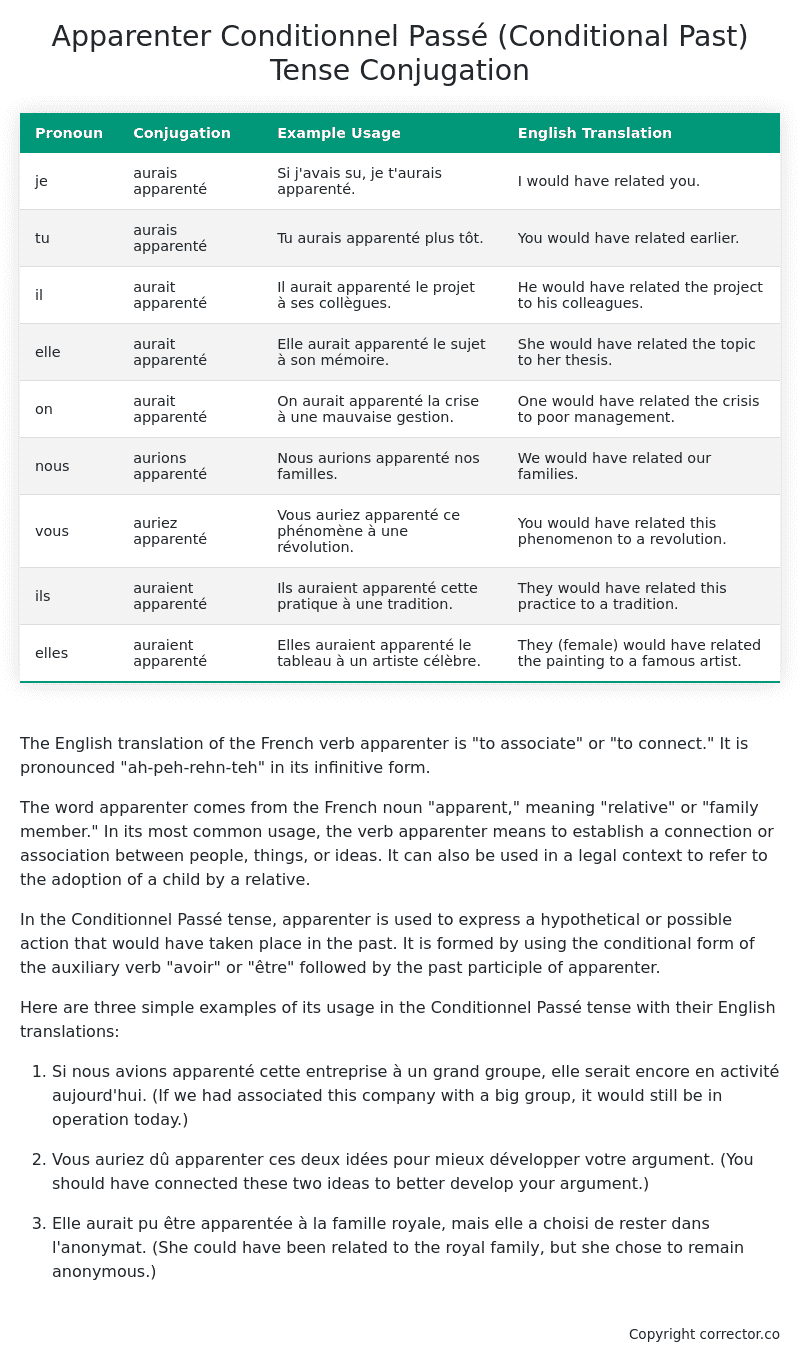Conditionnel Passé (Conditional Past) Tense Conjugation of the French Verb apparenter
Introduction to the verb apparenter
The English translation of the French verb apparenter is “to associate” or “to connect.” It is pronounced “ah-peh-rehn-teh” in its infinitive form.
The word apparenter comes from the French noun “apparent,” meaning “relative” or “family member.” In its most common usage, the verb apparenter means to establish a connection or association between people, things, or ideas. It can also be used in a legal context to refer to the adoption of a child by a relative.
In the Conditionnel Passé tense, apparenter is used to express a hypothetical or possible action that would have taken place in the past. It is formed by using the conditional form of the auxiliary verb “avoir” or “être” followed by the past participle of apparenter.
Here are three simple examples of its usage in the Conditionnel Passé tense with their English translations:
-
Si nous avions apparenté cette entreprise à un grand groupe, elle serait encore en activité aujourd’hui. (If we had associated this company with a big group, it would still be in operation today.)
-
Vous auriez dû apparenter ces deux idées pour mieux développer votre argument. (You should have connected these two ideas to better develop your argument.)
-
Elle aurait pu être apparentée à la famille royale, mais elle a choisi de rester dans l’anonymat. (She could have been related to the royal family, but she chose to remain anonymous.)
Table of the Conditionnel Passé (Conditional Past) Tense Conjugation of apparenter
| Pronoun | Conjugation | Example Usage | English Translation |
|---|---|---|---|
| je | aurais apparenté | Si j’avais su, je t’aurais apparenté. | I would have related you. |
| tu | aurais apparenté | Tu aurais apparenté plus tôt. | You would have related earlier. |
| il | aurait apparenté | Il aurait apparenté le projet à ses collègues. | He would have related the project to his colleagues. |
| elle | aurait apparenté | Elle aurait apparenté le sujet à son mémoire. | She would have related the topic to her thesis. |
| on | aurait apparenté | On aurait apparenté la crise à une mauvaise gestion. | One would have related the crisis to poor management. |
| nous | aurions apparenté | Nous aurions apparenté nos familles. | We would have related our families. |
| vous | auriez apparenté | Vous auriez apparenté ce phénomène à une révolution. | You would have related this phenomenon to a revolution. |
| ils | auraient apparenté | Ils auraient apparenté cette pratique à une tradition. | They would have related this practice to a tradition. |
| elles | auraient apparenté | Elles auraient apparenté le tableau à un artiste célèbre. | They (female) would have related the painting to a famous artist. |
Other Conjugations for Apparenter.
Le Present (Present Tense) Conjugation of the French Verb apparenter
Imparfait (Imperfect) Tense Conjugation of the French Verb apparenter
Passé Simple (Simple Past) Tense Conjugation of the French Verb apparenter
Passé Composé (Present Perfect) Tense Conjugation of the French Verb apparenter
Futur Simple (Simple Future) Tense Conjugation of the French Verb apparenter
Futur Proche (Near Future) Tense Conjugation of the French Verb apparenter
Plus-que-parfait (Pluperfect) Tense Conjugation of the French Verb apparenter
Passé Antérieur (Past Anterior) Tense Conjugation of the French Verb apparenter
Futur Antérieur (Future Anterior) Tense Conjugation of the French Verb apparenter
Subjonctif Présent (Subjunctive Present) Tense Conjugation of the French Verb apparenter
Subjonctif Passé (Subjunctive Past) Tense Conjugation of the French Verb apparenter
Subjonctif Imparfait (Subjunctive Imperfect) Tense Conjugation of the French Verb apparenter
Subjonctif Plus-que-parfait (Subjunctive Pluperfect) Tense Conjugation of the French Verb apparenter
Conditionnel Présent (Conditional Present) Tense Conjugation of the French Verb apparenter
Conditionnel Passé (Conditional Past) Tense Conjugation of the French Verb apparenter (this article)
L’impératif Présent (Imperative Present) Tense Conjugation of the French Verb apparenter
L’infinitif Présent (Infinitive Present) Tense Conjugation of the French Verb apparenter
Struggling with French verbs or the language in general? Why not use our free French Grammar Checker – no registration required!
Get a FREE Download Study Sheet of this Conjugation 🔥
Simply right click the image below, click “save image” and get your free reference for the apparenter Conditionnel Passé tense conjugation!

Apparenter – About the French Conditionnel Passé (Conditional Past) Tense
Formation
Common Everyday Usage Patterns
Expressing Unreal Past Scenarios
Polite Requests or Suggestions
Expressing Doubt or Uncertainty
Interactions with Other Tenses
Conditional Present
Indicative Past Tenses
Conditional Future
Summary
Want More?
I hope you enjoyed this article on the verb apparenter. Still in a learning mood? Check out another TOTALLY random French verb conjugation!


